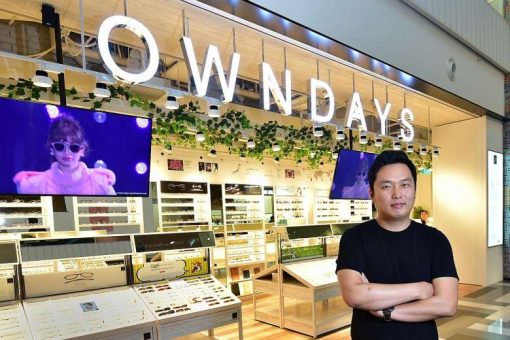THE STRAITS TIMES
Japanese brands doing well despite local retail slump

Mr Umiyama, managing director of Owndays Singapore, outside the chain’s new store in Tiong Bahru Plaza. He attributes its success here to a simple price structure and quick service as compared to local shops. Many Owndays customers can collect their spectacles within 20 minutes. ST PHOTO: DIOS VINCOY JR
Quality, good service and affordable prices allow Owndays, Uniqlo and Muji to expand
PUBLISHED APR 25, 2016, 5:00 AM SGT
Jalelah Abu Baker (mailto:jalmsab@sph.com.sg)
Even as some brands like British fashion store New Look and French menswear chain Celio exit Singapore amid a weak retail scene, several Japanese labels – spectacles chain Owndays, fashion store Uniqlo and lifestyle retailer Muji – are bucking the trend and expanding.
Earlier this month, Owndays opened its 18th outlet in Tiong Bahru Plaza, following its first store here at Plaza Singapura in July 2013. And it is planning to open even more outlets.
Owndays Singapore’s managing director Takeshi Umiyama told The Straits Times that in the next two years, the chain plans to bump the number of stores up to 25.
This is on the back of the chain’s sales revenue in Singapore rising. The chain, which manufactures its own glasses and sunglasses, made $25.5 million last year, 75 per cent more than the $14.6 million in 2014. The company projects sales this year to reach $40 million .
Mr Umiyama attributes Owndays’ success partly to it plugging a market gap here. “The optical shops here are generally traditional, and have not changed over the years. They were doing well, so there was no need to change,” he said, pointing to how many do not offer a simple price structure and quick service.
DIFFERENT BUSINESS MODEL
“The optical shops here are generally traditional, and have not changed over the years. They were doing well, so there was no need to change.” MR TAKESHI UMIYAMA, Owndays Singapore’s managing director , on the market gap that Owndays filled.
In many cases, Owndays customers can collect their spectacles within 20 minutes as the shops stock 2,000 to 3,000 types of lenses at any one time. The spectacles, including the frames, go for set prices of between $98 and $198.
Owndays’ expansion comes even as retail sales, excluding motor vehicles, decreased 1.2 per cent last year from 2014, according to data from the Singapore Department of Statistics.
Low sales, rising costs and weak consumer sentiment have been cited as reasons for the weaker showing for the retail sector. Several brands have recently announced plans to exit Singapore amid the slump.
Another Japanese retailer which has forged a different path is Uniqlo. Last month, it announced plans to open its first global flagship store here in the third quarter of this year. The store would be Uniqlo’s 26th outlet in Singapore.
The shop will have a sales area of 2,700 sq m and take up three levels at Orchard Central. It will offer high- tech displays and a wide range of products, including the latest lines for children and babies.
Uniqlo’s spokesman said that Singapore “is the ideal location for us to open our first Uniqlo global flagship store in the region”.
Another Japanese retailer, Muji, also announced last month that it is setting up a flagship store here, although it did not say when it would open.
The new store, measuring about 3,300 sq m, will feature an “Open Muji” concept where community creators will be invited to interact with the brand.
The three Japanese brands have been able to go against the grain in the retail scene here because they sell durable products that are necessities, and because of the general popularity of Japanese products in Singapore, said Dr Dianna Chang , a lecturer at SIM University’s School of Business.
“Combined with the affordability of these products, these retailers are rather resistant to, or are even able to thrive in economic downturns,” she added.
Besides attractive prices, Associate Professor of Marketing Prem Shamdasani from the National University of Singapore Business School added that Singapore customers also value good quality and service, which the Japanese brands have been able to deliver.
Adjunct Associate Professor Lynda Wee, from Nanyang Technological University’s Nanyang Business School, said the brands’ ability to understand who their core customers are and what these shoppers want has also allowed them to expand.
“For example, Uniqlo knows its target customers want comfortable wear that is affordable yet stylish and innovative, such as in terms of design and the use of fabrics ideal for Singapore’s climate,” said Dr Wee.
“Once they earn the trust of their customers by meeting and exceeding their needs, they expand their brand promise to other (segments), such as (clothes for) kids and babies. Hence, the brand is scalable.”
Missing out on our exclusive articles?
Get two weeks of free access to The Straits Times and experience the best work from the ST newsroom. No credit card required.
Get 2-Week Free Access
Terms & Conditions | Data Protection Policy | Need help? Reach us here. | Advertise with us
SPH Digital News / Copyright © 2018 Singapore Press Holdings Ltd. Co. Regn. No. 198402868E. All rights reserved
https://www.straitstimes.com/singapore/japanese-brands-doing-well-despite-local-retail-slump

